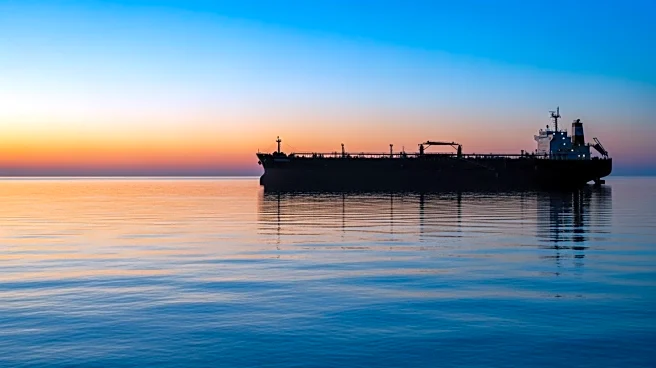What's Happening?
Iran has released the tanker Talara, which was seized by the Islamic Revolutionary Guard Corps (IRGC) in the Strait of Hormuz. The vessel was detained for five days but has now been freed without its cargo. The IRGC claimed the vessel was carrying 30,000
tonnes of petroleum products being transported illegally to Singapore. The crew of 21 is reported to be safe and in good spirits. The incident follows Iran's history of targeting merchant vessels, raising concerns about regional tensions. The IRGC's actions appear to be limited to the cargo, as the crew, ship, owner, and manager were not accused of any wrongdoing.
Why It's Important?
The release of the Talara highlights ongoing tensions in the Strait of Hormuz, a critical maritime passage for global oil shipments. Iran's actions could impact international shipping and oil markets, as the region is vital for energy transportation. The incident underscores the geopolitical risks associated with Iran's maritime activities, potentially affecting global oil prices and supply chains. Additionally, the situation reflects broader strategic concerns in U.S.-Iran relations, as Iran continues to assert its influence in the region, which could lead to further diplomatic and economic repercussions.
What's Next?
The release of the Talara may lead to increased scrutiny and security measures in the Strait of Hormuz by international maritime authorities. Shipping companies might reassess their routes and security protocols to mitigate risks associated with Iranian territorial waters. The incident could prompt diplomatic discussions between Iran and affected countries, aiming to prevent future seizures and ensure safe passage for merchant vessels. Additionally, Iran's actions may influence U.S. foreign policy decisions regarding sanctions and diplomatic engagement with Tehran.
Beyond the Headlines
The seizure and release of the Talara could have long-term implications for maritime law enforcement and international relations. Iran's actions may challenge existing norms regarding the legality of intercepting foreign vessels, potentially leading to legal disputes and calls for international arbitration. The incident also highlights the strategic importance of the Strait of Hormuz, which could become a focal point for regional power dynamics and military presence. Furthermore, the situation may affect Iran's relations with neighboring countries and its standing in the international community.















